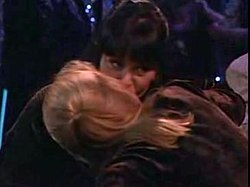Don't Ask, Don't Tell (Roseanne)
| "Don't Ask, Don't Tell" | |
|---|---|
| Roseanne episode | |
 Sharon kissing Roseanne | |
| Episode no. | Season 6 Episode 18 |
| Directed by | Philip Charles MacKenzie |
| Written by | |
| Featured music | W.G. Walden |
| Production code | 718 |
| Original air date | March 1, 1994 |
| Guest appearance | |
| |
"Don't Ask, Don't Tell" is the eighteenth episode of the sixth season of the American
"Don't Ask, Don't Tell" generated enormous controversy before it aired because it included a same-sex kiss between Roseanne and Sharon, played by guest star Mariel Hemingway. ABC initially planned not to air the episode. The network eventually relented and the episode was viewed by an audience of some 30 million people. "Don't Ask, Don't Tell" was an early entry on a list of American television episodes in which a lesbian or possibly lesbian character kisses a straight-identifying character. These lesbian kiss episodes often occurred during times of the year when networks were most concerned about generating ratings, and have come to be viewed by some critics as gimmicks to help secure those ratings.
Plot
To prove that she's cool, Roseanne Conner (Roseanne Barr) goes out dancing at a gay bar called "Lips" with her sister Jackie (Laurie Metcalf) and friend Nancy (Sandra Bernhard) and Nancy's girlfriend Sharon (Mariel Hemingway). Roseanne is having fun until Sharon kisses her, causing Roseanne anxiety. The next day, after discussing the kiss with Jackie and getting into an argument with Nancy, Roseanne realizes that she may not be as cool as she thinks she is.
Reception and controversy
ABC, fearing viewer and sponsor backlash, initially planned not to air the episode. Roseanne executive producer
Television critic Frank Rich of The New York Times called "Don't Ask, Don't Tell" "a small step forward for the stirring of homosexuals into the American melting pot"[3] and a "sophisticated half-hour [that] turned homophobia on its ear".[3] "Don't Ask, Don't Tell" scored 30 million viewers upon first airing.[6] Approximately 100 telephone calls came in to ABC in response to the episode, with most of them being positive.[3] Writers Stan Zimmerman and Jim Berg were nominated for a Writers Guild of America award for their work on the episode.[7]
Roseanne was one of the first American television series to feature an intimate kiss between two women. Three years earlier, "Eminently visual; cheap, provided the actors are willing; controversial, year in and year out; and elegantly reversible (sweeps lesbians typically vanish or go straight when the week's over), kisses between women are perfect sweeps stunts. They offer something for everyone, from advocacy groups looking for role models to indignation-seeking conservatives, from goggle-eyed male viewers to progressive female ones, from tyrants who demand psychological complexity to plot buffs."[9]
Michele Greene confirmed in an interview with
During a period in network television history when producers were pushing the broadcast boundaries on sexually explicit content with such shows as
Mariel Hemingway reprised her role as Sharon in the 1995 episode "December Bride", in which long-time character Leon (Martin Mull) marries his boyfriend Scott (Fred Willard). Roseanne's husband Dan (John Goodman) is distressed at seeing two men kiss and Roseanne chastises him for making a fuss about two people of the same sex kissing. Sharon then sits down behind Roseanne and says hi. Her cameo serves as a callback to this episode and the controversy it engendered.
Hemingway had also playfully made light of the controversy outside of Roseanne: on September 30, 1995, during her opening monologue while hosting the season premiere of Saturday Night Live, she took viewers on an introductory backstage tour of the show - which had been recast and re-branded over the summer - in which she kissed all three female cast members and director Beth McCarthy.[12]
Notes
- ^ a b Lowry, Brian (February 18, 1994). "ABC to air 'Roseanne' seg with warning label". Variety. Retrieved November 17, 2008.
- ^ Gross, p. 89
- ^ a b c d e Rich, Frank (March 6, 1994). "Journal; What Now My Love". New York Times. Retrieved November 17, 2008.
- ^ Gross, p. 90
- ^ Elliott, Stuart (February 23, 1994). "Advertising; Big Marketers Are Divided On Issue of Homosexuality". The New York Times. Retrieved November 17, 2008.
- ^ Semonche, p. 208
- ^ Horbelt, Stephan. "Los Angeles Uncovered: Two of a Kind". Frontiers. Vol. 27, no. 14. Retrieved November 17, 2008. [dead link]
- ^ Lo, Malinda (March 2005). "Back in the Day: The Kiss Heard Around the World". AfterEllen.com. Archived from the original on October 23, 2008. Retrieved November 2, 2008.
- ^ Heffernan, Virginia (February 10, 2005). "Critic's Notebook; It's February. Pucker Up, TV Actresses". New York Times. Archived from the original on May 29, 2015. Retrieved November 1, 2008.
- ^ Warn, Sarah (March 2003). "Interview with Michele Green (sic)". AfterEllen.com. Archived from the original on September 29, 2008. Retrieved November 2, 2008.
- ^ Becker, p. 179
- ^ Saturday Night Live transcript: Mariel Hemingway
References
- Becker, Ron (2006). Gay TV and Straight America. Rutgers University Press. ISBN 0-8135-3689-8.
- Gross, Larry P. (2001). Up from Invisibility: Lesbians, Gay Men, and the Media in America. Columbia University Press. ISBN 0-231-11952-6.
- Semonche, John E. (2007). Censoring Sex: A Historical Journey Through American Media. Rowman & Littlefield. ISBN 0-7425-5132-6.
External links
- Don't Ask, Don't Tell at Internet Movie Database
